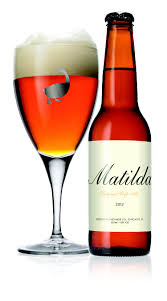 I don’t think I have seen a brewery recently that has evoked as much debate and disagreement as Goose Island. Before its purchase by ABInbev a few years ago, Goose Island was broadly and vaguely respected by most beer fans. Some liked their approach to brewing, others didn’t, but most agreed it was a solid craft brewer.
I don’t think I have seen a brewery recently that has evoked as much debate and disagreement as Goose Island. Before its purchase by ABInbev a few years ago, Goose Island was broadly and vaguely respected by most beer fans. Some liked their approach to brewing, others didn’t, but most agreed it was a solid craft brewer.
Jump to today and opinions are much more polarized. Many argue that its beer have changed for the worse (although I am not sure I agree), noting – among other complaints – that their flagship beer are now being brewed in various ABInbev facilities. Others point to the much broader distribution Goose Island now receives thanks to its new owners and suggest that is good for beer drinkers. I acknowledge it can be hard to swallow the fact that Goose Island got swallowed by the largest beer corporation in the world. But it is also intriguing to be able, if nothing else, to try some of Goose Island’s rarer and more respected beer.
A case in point: Matilda. Long known as one of Goose Island’s better beer (and award-winning in its younger years) and seen as a sister to Sofie, it is now fairly easily accessible in our part of the world. It is a Belgian Pale Ale, a style that I personally believe is quite difficult to brew well. Despite vague misgivings about forking over good money to ABInbev, I picked up a bottle a while back.
It pours pale orange, offering good clarity. It is very, very effervescent which helps to build a rocky white head. A moderate amount of lacing builds down the side of the glass. The aroma is very fruity. I detect apricot, raisin and a bit of grapefruit. I also get some honey, meadowflower and touches of sweet malt. The background accents a light, subdued spicy yeast character.
The taste starts with a smooth, almost silky malt sweetness along with toffee, fruit, honey and a light graininess. An earthy, musty character builds in the middle as do some floral notes and a bit of pepper. The finish is wonderfully balanced between malt, a hint of hops and a growing yeasty spiciness of light pepper, dust and other phenols.
I find this beer to be simultaneously complex and subtle. It nails the balance between yeast spiciness and the base beer. It is decidedly Belgian and offers a better-than-most interpretation of Belgian Pale Ale.
Has the beer been changed since the takeover? I can’t say because I never had the opportunity to try it before. And there, my friends, is the core of the dilemma with Goose Island. We have more access to its beer than ever before, but we simply can’t be sure that they are the same, unadulterated versions beer fans appreciated in Chicago and environs years ago.
Personally, I am not sure what to do with Goose Island. But somehow, some way, I keep finding myself trying their beer. I don’t know what that says about me.

April 19, 2016 at 1:48 PM
Good beer is good beer. I have enjoyed their Honkers. It is a very good bitter. I’ve tried it on tap in Chicago before they got bought out and it tasted just as good (going by memory and totally subjective). Anyways, I will always choose a more local alternative if available but if all you have is Bud, Canadian, etc or Honkers…well Honkers will win every time! Anyways I wouldn’t lose too much sleep over liking Matilda.
April 19, 2016 at 9:22 PM
“Personally, I am not sure what to do with Goose Island.”
The same thing you do with any other beer. Drink it if you like it. It’s as simple as that. Craft brewers don’t suffer if craft beer drinkers drink an occasional high-quality beer from the big boys. Encouraging the big guys to brew more quality beer is good for the entire industry, as it will help drive macro beer drinkers towards craft. The craft beer industry, however, does suffer when beer drinkers drink craft beer, regardless of quality, simply because it’s craft beer.
April 20, 2016 at 7:47 AM
For me, I finally tried it when forced to in rural Newfoundland. There, in a wall covered in bland choices of Molson, Coors, Labatt Blue, and Bud ( + Black Horse and Blue Star), was a tastier offering I was lucky to find. It was also the only descent offering at the bar at the Halifax airport (which is another rant altogether). So, I agree, if the outcome of the big guys buying tasty microbreweries is distribution of tasty beer to places that would otherwise have crap, than that’s good to me.